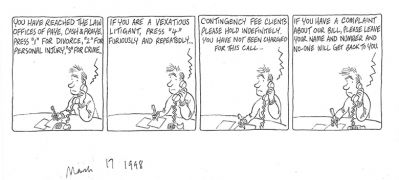Following on from the Legal Service Board’s recent report into referral fees, which concluded that there was no evidence that referral fees caused consumer detriment, is the Legal Services Consumer Panel’s report which called for greater disclosure of referral fees and better regulation, but found that the payments do have a place in the legal services market and should be allowed to continue. The full story can be read on the Legal Futures website.
So, is this all good news for claimant solicitors who favour referral fees and a kick in the teeth for Lord Justice Jackson who wanted a ban? Hardly.
The really interesting part of the report commissioned by the Legal Service Board is the conclusion that despite referral fees in RTA claims being typically around £800 (where the solicitors’ recoverable profit costs will often be in the region of only £1,200), there is “no evidence of any detrimental effect on the quality of service arising from the payment of referral fees”. Read that quote again. Solicitors are apparently able to run typical RTA claims for around £400, presumably make a profit and with no drop in the quality of service. It is hard to imagine a finding more likely to strengthen Jackson LJ’s attempt to reduce costs to something more proportionate.
The report also explained that typical referral fees in RTA claims have increased from around £200 in 2004 to £800 now. This has been a transfer of profit from solicitors to third parties.
One argument in support of the continuation of referral fees is that it generates increased claims, through increased marketing activities raising awareness amongst the public, and therefore promotes access to justice. The basis for this claim in the LSB report was the upturn in RTA claims in recent years, despite the reduction in RTA accidents. The overall drop over the same period in relation to EL claims is dismissed out-of-hand by the report on the basis that EL claims are unconnected to referral fee generated marketing. The report, conspicuously, fails to mention PL claims. I therefore did their work for them and went back to the CRU data so see what that shows. For those interested, it can be found at Appendix 25 of Jackson’s LJ’s preliminary report. This shows a significant drop in PL claims during this period (although an increased success rate). If claims management marketing has had such a positive impact on RTA claims why has it had no positive impact on PL claims? It seems unlikely that there has been a significant drop in actual accidents during this period. Whatever the explanation is for the increase in RTA claims, it is unlikely to be related to referral fees in my humble opinion.
The referral fee game has simply resulted in a transfer of profit away from solicitors to third parties. I have no big problem with that, but surely the better response is to reduce fixed fees and hourly rates. The increase in the level of referral fees has been driven by what the market can bear. Reduce the Stage 1 and 2 payments for the new RTA Protocol to £400 in total and referral fees will disappear on their own. There will be no money to pay them. And, with no “detrimental effect on the quality of service”.

